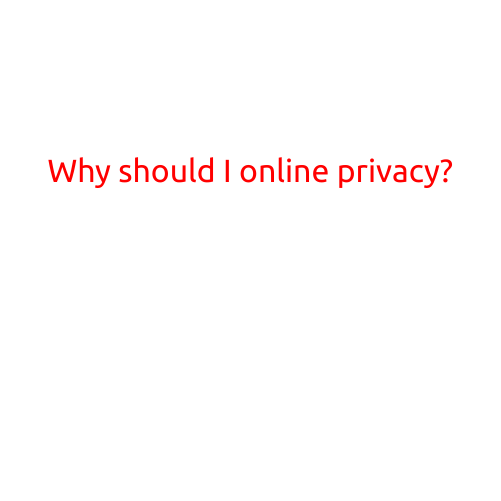
Why Should I Care About Online Privacy?
In today’s digital age, it’s easy to get caught up in the convenience and accessibility of online services. From social media to online banking, we’re constantly sharing our personal information with the world. But at what cost? Online privacy is a topic that’s often overlooked, but it’s more important than ever to prioritize your digital security.
Why Online Privacy Matters
Your online privacy is not just about protecting your personal data from hackers and cybercriminals. It’s also about having control over what information is shared, with whom, and how it’s used. When you don’t take steps to protect your online privacy, you’re leaving your digital footprint open to exploitation.
Here are just a few reasons why online privacy is essential:
- Data Breaches: Hackers and cybercriminals are getting more sophisticated by the day. If your personal data is stolen, it can be used for identity theft, financial fraud, or even blackmail.
- Targeted Advertising: When you’re tracked online, you’re vulnerable to targeted advertising that can be creepy and invasive. You may see ads that are tailored to your browsing history, which can be unsettling and even compromised your identity.
- Government Surveillance: Governments around the world are increasingly collecting and analyzing online data to monitor citizens’ activities. Without proper privacy protections, your online activities could be monitored and used against you.
- Reputation Damage: Personal data breaches can also damage your reputation and impact your professional and personal relationships.
How to Protect Your Online Privacy
Fortunately, protecting your online privacy is easier than you think. Here are some steps you can take:
- Use Strong Passwords: Use unique, complex passwords for each account, and consider using a password manager to keep track of them.
- Enable Two-Factor Authentication: Two-factor authentication adds an extra layer of security by requiring a second form of verification, such as a code sent to your phone.
- Browse Privately: Use a private browsing mode or a virtual private network (VPN) to mask your IP address and browsing history.
- Monitor Your Credit Report: Check your credit report regularly to detect any suspicious activity.
- Use Antivirus Software: Install antivirus software to protect your devices from malware and viruses.
- Keep Your Software Up to Date: Regularly update your operating system, browser, and other software to patch security holes and vulnerabilities.
- Use Secure Search Engines: Use search engines that offer strong privacy protections, such as DuckDuckGo or StartPage.
Conclusion
Online privacy is not just a concern for tech-savvy individuals or hackers. It’s a vital aspect of our digital lives that affects us all. By taking simple steps to protect your online privacy, you can reduce your risk of data breaches, targeted advertising, and government surveillance. Remember, your online privacy is your responsibility, and it’s up to you to take control of your digital footprint.





